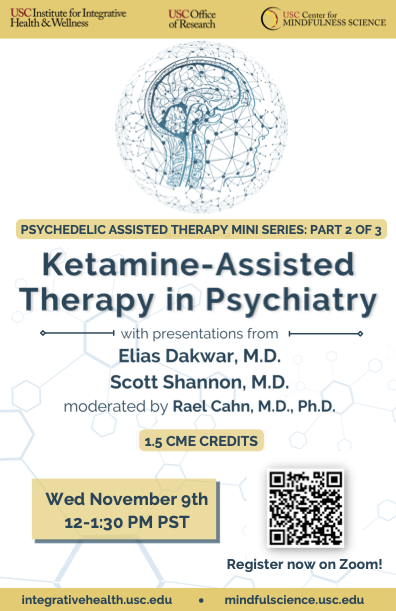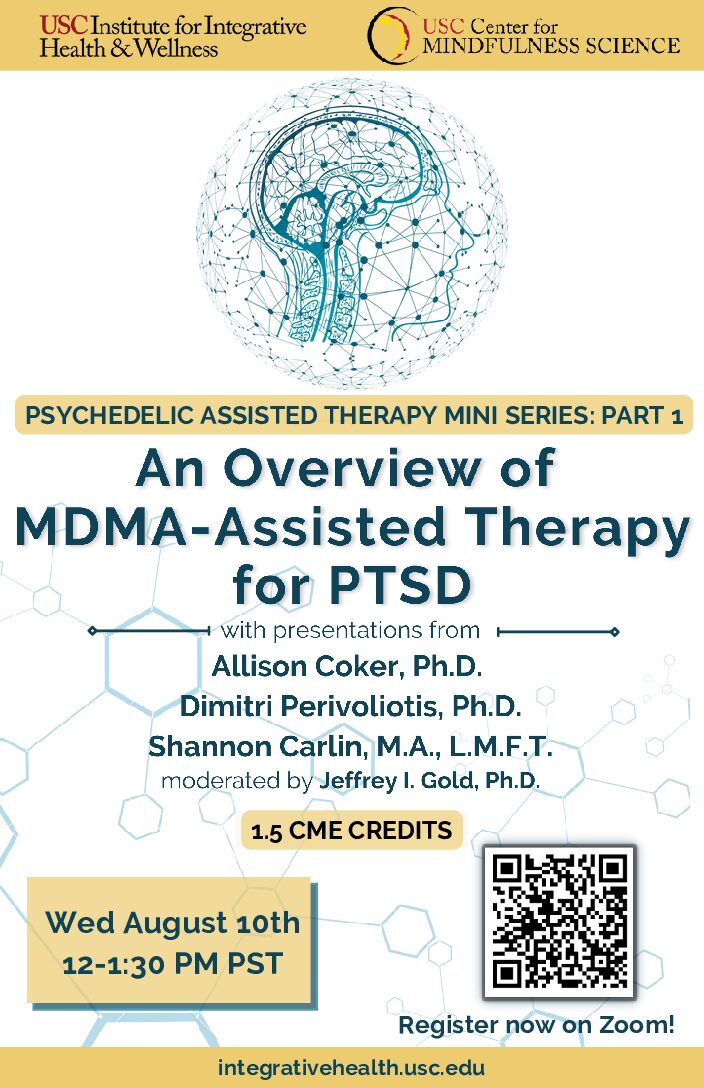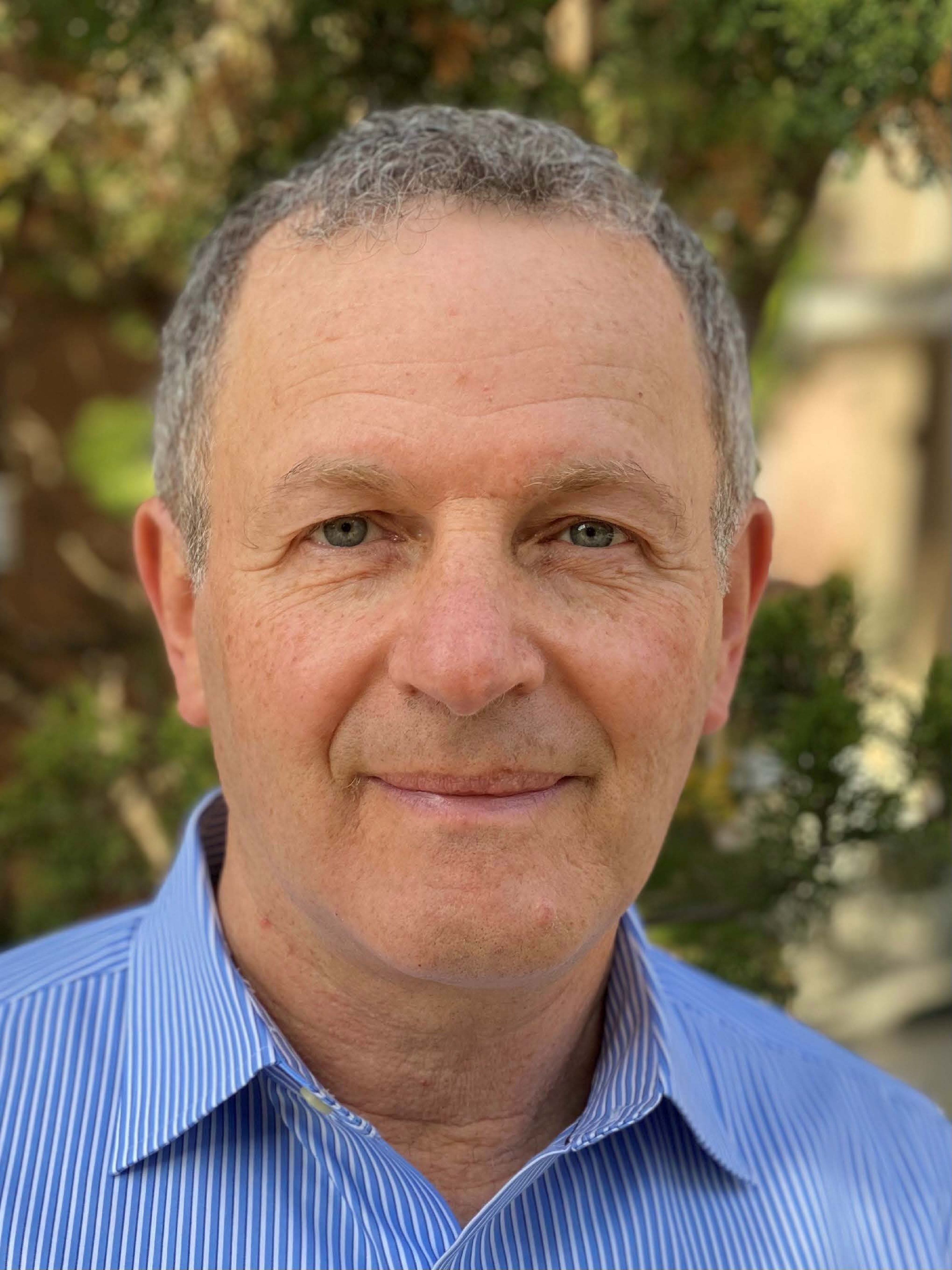Past Events
- Dec
- 12
- 2022
Mindfulness meditation from the lenses of phenomenology and neurosciences
- Time:12:00 pm
-
Location:
ONLINE- Please click on RSVP to register

Mindfulness meditation practices can be conceptualized as a set of attention-based, regulatory and self-inquiry training regimes cultivated for various ends, including the training of well-being and psychological health. In this presentation, Dr. Lutz will first review a model which conceptualizes mindfulness-related states and traits as a multidimensional phenomenal matrix that can readily be expressed into a neurocognitive framework. This phenomenal and neurocognitive matrix of mindfulness is presented as a heuristic to guide formulation of research hypotheses from both cognitive/behavioral and neuroscientific perspectives. Dr. Lutz will then discuss recent behavioral, physiologic, and neural results related to mindfulness practice and training from our groups and from collaborators. He will focus in particular on the role in these practices of meta-awareness and dereification. In the last part of the presentation, Dr. Lutz will…
- Nov
- 09
- 2022
Psychedelic Assisted Therapy Mini Series Part 2 | Ketamine-assisted therapy in psychiatry: Spiritual, group and meditative frameworks potentiating clinical benefits
- Time:12:00 pm
-
Location:
ONLINE- Please click on RSVP to register

In the second part of a three-part mini series on psychedelic assisted therapies in collaboration with the Institute of Integrative Health and Wellness (IIHW) Dr. Scott Shannon will explore how the psychedelic framework of relationship, music, set and setting can exploit the malleable effects of ketamine on consciousness. He will review his data about group ketamine-assisted psychotherapy for healthcare workers and his experience training a few hundred professionals in an experiential group model of KAP. Scott will compare and contrast ketamine to MDMA for the treatment of trauma and speculate about the spiritual benefits of this well-known agent. Dr. Elias Dakwar will discuss the results of his research investigating ketamine coupled with mindfulness training on use-related measures in cocaine- and alcohol-dependent volunteers, as well as discuss the broader significance of ketamine and non-ordinary experiences in…
- Aug
- 10
- 2022
Psychedelic Assisted Therapy Mini Series Part 1 | An Overview Of MDMA-Assisted Therapy For PTSD
- Time:12:00 pm
-
Location:
ONLINE - Please click on RSVP to register

In the first part of a three-part mini series on psychedelic assisted therapies in collaboration with the Institute of Integrative Health and Wellness (IIHW), researchers from the Multidisciplinary Association for Psychedelic Studies Public Benefit Corporation (MAPS PBC) address the current scientific landscape of MDMA-assisted therapy for PTSD, including the underlying mechanisms and treatment protocols.
- Apr
- 13
- 2022
The promise of mindfulness-based clinical interventions: Rationale, findings, and future directions
- Time:12:00 pm
-
Location:
ONLINE- Please click on RSVP to register

Mental health problems and adversity in our world today are prevalent and impairing, including among parents, children, and youth. Few who need support receive it, and many existing interventions do not offer lasting help. The social and personal costs of inattention to these problems are clear. Commitment to creating a better future draws many to the study and practice of mindfulness and other contemplative practices. This presentation will explore the following key questions: What are the limitations of extant approaches to common mental health problems? To what extent and in what ways do mindfulness-based interventions offer benefit? What challenges and cautions must be addressed if the promises of mindfulness-based interventions are to be realized?
- Mar
- 23
- 2022
Mindfulness Based Cognitive Therapy and Affect Regulation In Mood and Anxiety Disorders
- Time:12:00 pm
-
Location:
ONLINE- Please click on RSVP to register

Mindfulness Based Cognitive Therapy is constructed from seemingly disparate elements – training in mindfulness meditation offered alongside cognitive theory of affective disorder. It has amassed a strong evidence in both reducing symptom burden and fostering wellness. At present, the question of how exactly this multi-modal treatment achieves its benefits remains largely unanswered. It is still fair to ask, for example, about the relative contribution of cognitive therapy principles versus mindfulness practice to the gains patients report. Clarifying mechanisms of action is of more than academic interest, as it will likely inform models of training for the generation of MBCT practitioners along with building a transtheoretical model of how mindfulness based programs work.
- Mar
- 22
- 2022
Mobilizing Mindfulness Research Workshop
- Time:4:00 pm
-
Location:
ONLINE- Please click on RSVP to register

Designed for USC undergraduate, graduate, medical students, and residents/fellows. Come learn the fundamentals of conducting research in the area of mindfulness! In this workshop, you will learn to: Plan, design, and debug a research proposal Obtain your HIPAA & CITI Certifications and how to apply for IRB approval Seek funding for your research and write a grant proposal Learn to write a manuscript and submit it for publication Workshop Aims: Develop a mindfulness-focused research proposal Write a grant proposal Submit an IRB application Write and submit a research manuscript for publication Dates: March 22nd, March 29th, April 5th, & April 12th (PLAN TO ATTEND ALL FOUR DATES) Time: 4:00pm-6:00pm Location: Online (Zoom). Register Here!
- Feb
- 23
- 2022
Scaling meditation: Maximising benefits and minimising harms
- Time:4:00 pm
-
Location:
ONLINE- Please click on RSVP to register

As more and more people take up meditation for a variety of reasons across a plethora of settings, it is imperative that we understand how and whether different approaches to meditation work for given individuals, seeking to address specific problems or achieve specific goals. Despite popular suggestions that meditation is the cure to all our problems and that everyone can do it on their own, evidence suggests that while some may find it life-transforming, others may find it uninspiring, and still others may find it harmful. In this talk I will review what we know and what we don't about meditation and present recent data about such critical areas as motivation for practice, dose-response effects, and unexpected experiences. I will also present suggestions for the kind of work necessary in…
- Feb
- 08
- 2022
Strengthening Attention and Working Memory with Mindfulness Training
- Time:12:00 pm
-
Location:
ONLINE- Please click on RSVP to register

This presentation will discuss recent findings regarding the effectiveness of mindfulness training to strengthen attention and well-being in high stress/high demand environments. A growing literature finds that protracted periods of high stress degrade cognitive functioning and psychological health, which can lead to performance lapses that can be consequential. Our research involving a broad range of groups, such as military servicemembers, elite athletes, business professionals, medical and nursing students, and others has found that attention, working memory, and mood improve with mindfulness-based interventions. Based on these findings, I argue that mindfulness training programs should be further offered and investigated in such settings.
- Jan
- 19
- 2022
The Evidence and Therapeutic Use of Mindfulness for Chronic Low Back Pain
- Time:12:00 pm
-
Location:
ONLINE- Please click on RSVP for Zoom link

Dr. Morone will discuss the current evidence for treating low back pain with mindfulness, why mindfulness is well suited for persons who have chronic pain, and discuss her current HEAL PRISM pragmatic clinical trial OPTIMUM.
- Dec
- 09
- 2021
Outsmart your pain – retraining your brain with mindfulness and self-compassion
- Time:4:00 pm
-
Location:
ONLINE- Please click on RSVP for Zoom link

While acute pain alerts us to a potential damage to the body, chronic pain functions in very different ways. One of the challenging aspects of chronic pain is that the brain learns pain and becomes “better” at detecting it. Pain levels are often highly susceptible to everything from sleep to food to the quality of our relationships and to stress levels in general. Mindfulness practice helps with shining the light on the different elements of pain and breaking them down into smaller, more manageable elements. This in turn often lowers pain intensity and length of flare ups while mindfulness not only works on the pain but lowers stress levels in general and re-connects us with a more easeful and joyous life. This lecture will be focusing on core mindfulness concepts…
